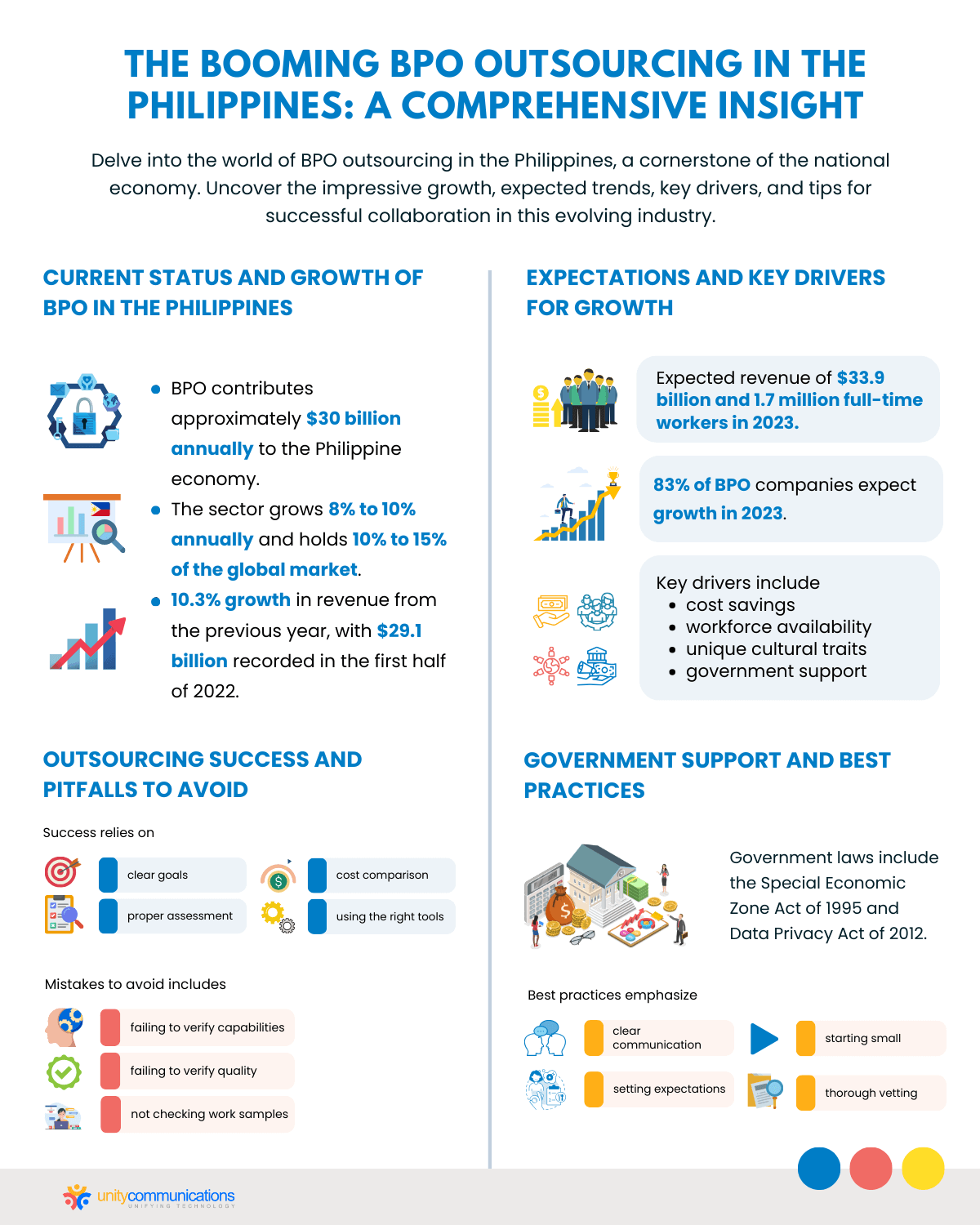IN THIS ARTICLE
Table of Contents
Workforce management challenges become more apparent as your business grows. You want to hire and retain the best talent while minimizing costs, especially when scaling up.
Thus, many organizations turn to offshore providers in the Philippines because they offer skilled and talented professionals at low costs.
This article explores the best practices in business process outsourcing (BPO). It also discusses mistakes to avoid when partnering with a BPO provider and the current status of the outsourcing industry in the Philippines.
Current Status of BPO in the Philippines
The BPO and outsourcing industries contribute roughly $30 billion annually to the Philippine economy. The sector grows by 8% to 10% annually and holds 10% to 15% of the global outsourcing market.
According to the IT and Business Process Association of the Philippines (IBPAP), the BPO industry recorded $29.1 billion in revenue during the first half of 2022. This high figure is due to the rising demand from global clients, increased confidence in remote work, and growth in the e-commerce, financial technology, and healthcare sectors.
Even better, the Philippine BPO industry managed to beat its 2022 targets. The industry recorded a 10.3% growth in revenue from the previous year. Full-time BPO employees also grew by 121,000, or 8.4%, in 2022. Currently, there are 1.57 million full-time workers in over 800 BPO companies nationwide.
The BPO industry will continue to play an essential role in the Philippine economy. The industry’s quick recovery from the past years will increase demand for information technology and business process management (IT-BPM) services.
What To Expect From the Philippine BPO Industry?

The BPO and outsourcing industry in the Philippines expects to reap benefits as countries worldwide encounter economic slowdowns and cut back on costs. IBPAP said that the industry might generate a total of $33.9 billion in revenue and increase the number of full-time workers to 1.7 million in 2023.
According to a survey from IBPAP, 83% of BPO companies expect to grow in 2023, despite the global recession. The institution said companies would likely continue outsourcing to drive cost optimization initiatives. Investment in the outsourcing industry will come from the following sectors:
- Contact center
- IT solutions
- Cybersecurity
- Shared services
- Internet service providers
- Financial technology
- Animation and game development
- Healthcare
Key Drivers Behind the Philippine BPO Industry’s Growth in 2024
BPO in the Philippines remains a top choice for many companies worldwide. The nation is often the first to come to mind when outsourcing customer service. The country even received the fifth-highest number of outsourcing inquiries, proving foreign clients’ interest in outsourcing to the Philippines.
Let us explore what makes this country an excellent location for outsourced services.
1. Significant Cost Savings
Engaging Filipino contact center agents is more cost-effective than keeping customer service in-house. To illustrate, average customer service representatives in the Philippines make $4,925.36 a year, while their U.S. counterparts make $57,396 annually.
In addition to competitive labor costs, Filipino agents provide high service quality and an exceptional customer experience. Productivity levels are also outstanding because most Filipinos value resilience and hard work.
2. Wide Availability of Workforce
A key reason businesses outsource to the Philippines is the wide availability of talent. The country has a large population of mostly young and employable individuals. This young demographic can better understand the technology and how it can boost business operations.
Besides the abundance of BPO workers, the country is home to many freelancers. A Forbes report states that the archipelago is the 6th fastest-growing freelancing market. Some freelancers also work in the BPO industry, taking on lead generation, virtual assistant, and technical support outsourcing roles in the Philippines.
3. Unique Traits of Filipinos
The Philippines is a top choice, especially for customer service outsourcing, due to Filipinos’ unique traits and excellent work ethics. Companies worldwide admire Filipinos for their innate hospitality, empathy, and hard work.
Many Filipinos also speak fluent English. Hence, American, European, and Australian customers have no problem speaking with a Filipino contact center agent.
Their high affinity for Western culture also facilitates the interaction between agents and customers. Agents need little training to understand the preferences and nuances of American consumers.
4. Strong Government Support
The local government strongly supports the outsourcing industry because it contributes significantly to the Philippine economy. The government has enacted several laws to facilitate a smooth outsourcing process.
The Special Economic Zone Act of 1995 led to the creation of the Philippine Economic Zone Authority (PEZA), which provides financial benefits and tax incentives to companies that establish BPO centers in the country.
The government also passed the Data Privacy Act of 2012 to ensure compliance with international information security standards. More recently, they signed the Telecommuting Act to create favorable working conditions for BPO providers and allow work-from-home arrangements.
How To Successfully Outsource to the Philippines

The local government made the front- and back-office outsourcing industry one of its primary focuses by strongly investing in incentive programs and workforce training. This encourages foreign business owners to support and work with local BPO companies. The country’s pro-BPO stance led the country to become one of the world’s top outsourcing locations.
Follow our BPO best practices below to achieve a successful outsourcing venture in the Philippines.
1. Determine the Best Approach for Your Business
Before outsourcing, you must determine the right approach for your organization. Do you want to offload simple tasks, hire an expert to handle specific areas of your business, or save on costs?
You cannot search for a service provider without first understanding your goals and how much you are willing to invest. The last thing you want is to waste time and money because you have unclear objectives.
2. Identify What You Can Outsource
Identify which functions, processes, and departments you can outsource to benefit your company. That way, you can offload more or fewer tasks than initially expected. This BPO best practice is essential to facilitate your next move when outsourcing to the Philippines, such as calculating costs.
Depending on what tasks benefit your organization most, you can outsource specific areas of operations or whole departments. Functions that will not impede the customer experience or impact the quality of your products are easier to delegate. Such tasks include:
- Accounting and finance
- Bookkeeping
- Data entry services
- Content or blog writing
- Legal documentation
- Diagnostic services
- IT
- Website design
- Logistics and fulfillment
3. Clarify Project Specifications and Expectations
Once you know your BPO objectives and the tasks you will be outsourcing to a Philippine service provider, you can draft the project specifications and expectations. You might already have an insight into the length of the project. For example, a long-term contract is better if you want to outsource tech solutions.
However, mapping turnaround time is a good idea for a one-time project such as one in graphic design. Be clear about deadlines and their importance to your service provider. Some functions might not have time constraints, but setting a general timeline prevents the project from dragging on too long.
4. Compare the Cost of Outsourcing
The next step is to identify what you are financially able to outsource using differential cost analysis. Compare the total BPO cost with the amount saved by outsourcing to the Philippines. A differential cost approach excludes unavoidable fixed costs from the computation, resulting in a more accurate comparison.
Compare costs using rates from multiple companies. This step helps you select the vendor that provides the best value for the lowest cost possible. Also, consider your prospective provider’s pricing model—whether hourly or fixed project rates.
- A fixed price ensures you will not exceed the budget, which is ideal if this is your first time outsourcing.
- Hourly rates are great for offshore teams working in customer service or a bookkeeper working a few hours a week. Just make sure to monitor the hours worked using time-tracking software.
5. Find the Right Service Provider
Once you are certain that BPO costs are lower than doing the function in-house and outsourcing to the Philippines makes sense for your organization, you can begin looking for a service provider. Conduct thorough research on the different vendors you plan on partnering with. This step is vital in determining the success of your outsourcing experience.
Ask your potential BPO partner to provide the following:
- Current and previous clients
- Reviews and feedback from former clients
- Current portfolio
- Proof of work quality
- Programs and processes they can perform
- Financial standing
Some factors to consider when selecting a BPO partner:
- Company background. This shows that the BPO company is established and has a proven track record of providing quality service. Ask them for references and how many clients they have in your industry.
- Compatibility. Choosing a BPO provider whose outsourcing team in the Philippines can work with your employees is essential. Compatible leadership styles, shared values, and mutual trust are crucial to successful outsourcing.
- Service structure. Outsourcing providers significantly differ in processes, technologies, and workforce. Ask questions, explain your desired outcomes, and carefully assess service agreements to find the best vendor to meet your needs.
6. Use the Right Tools to Manage Your Offshore Team
Managing an offshore team remotely is challenging, especially when your time zones differ. Delegating work, monitoring progress, and ensuring the team stays productive during billable hours is a hassle. However, you can use a productivity management tool to help with monitoring.
A time-tracking tool can:
- Monitor employee productivity and project progress using insightful reports
- Accurately track staff’s work hours
- Set productivity metrics to measure performance
- Integrate browser extensions to track time across different apps
Tips for Working with External BPO Providers in the Philippines

Working with a business process outsourcing company might not be something you have experienced. So, here are some additional tips to guarantee the success of your outsourcing initiative:
- Communicate regularly. Communication is crucial because outsourced tasks are hard to monitor in real time. With constant communication, both parties can keep up-to-date, reliably track progress, and check whether processes are accurate.
- Set clear expectations. Setting clear expectations helps prevent misaligned results and constant revision of outputs. Transparency also facilitates better problem-solving and prevents misunderstanding.
- Start small. Consider delegating simpler, less disruptive work to verify the provider’s capability before committing to a bigger project. This gives you a better picture of how the BPO company will tackle larger tasks and helps you verify if they are the right partner for your organization.
Mistakes to Avoid When Working with a BPO Provider in the Philippines
Some companies have had negative experiences with outsourcing. Most committed mistakes that led to unsuccessful outsourcing. Whether you are contracting a contact center as a service (CCaaS) or IT provider, avoid the following mistakes when choosing a partner:
- Not assessing the provider’s capability beyond online presence. What you see on a provider’s website is often a highly curated assortment of their best work and does not indicate their weaknesses. Therefore, vetting a potential vendor should include an online search and a series of virtual meetings where you ask for references.
- Not verifying low price considerations. Low rates often come with caveats, such as low-quality resources and entry-level agents, which impact overall service quality. Less experienced agents mean subpar work. Make sure to check how the service provider can offer such low fees.
- Not checking work samples to guarantee quality. Your potential partner claiming they can do something does not guarantee their expertise. They might want to avoid conflict, so they agree to take on the work you delegate to them, despite not having the full capability. Remember to ask for work samples and check quality.
The Bottom Line

Numerous studies and reports show that the Philippine outsourcing industry is here to stay. The Philippine BPO industry is resilient, just like its workforce. Filipinos’ outstanding work ethics, skills, talent, and great attitudes make them ideal for various BPO jobs. When looking for a provider, perform due diligence and assess their capabilities thoroughly.
Are you overwhelmed by the thought of building your offshore team in the Philippines? Do not worry! Unity Communications has got you. With our enterprise solution, you can sit back and relax while we perform your processes, from scouting candidates to managing payroll.
Let’s connect if you are ready to take your business to the next level.





